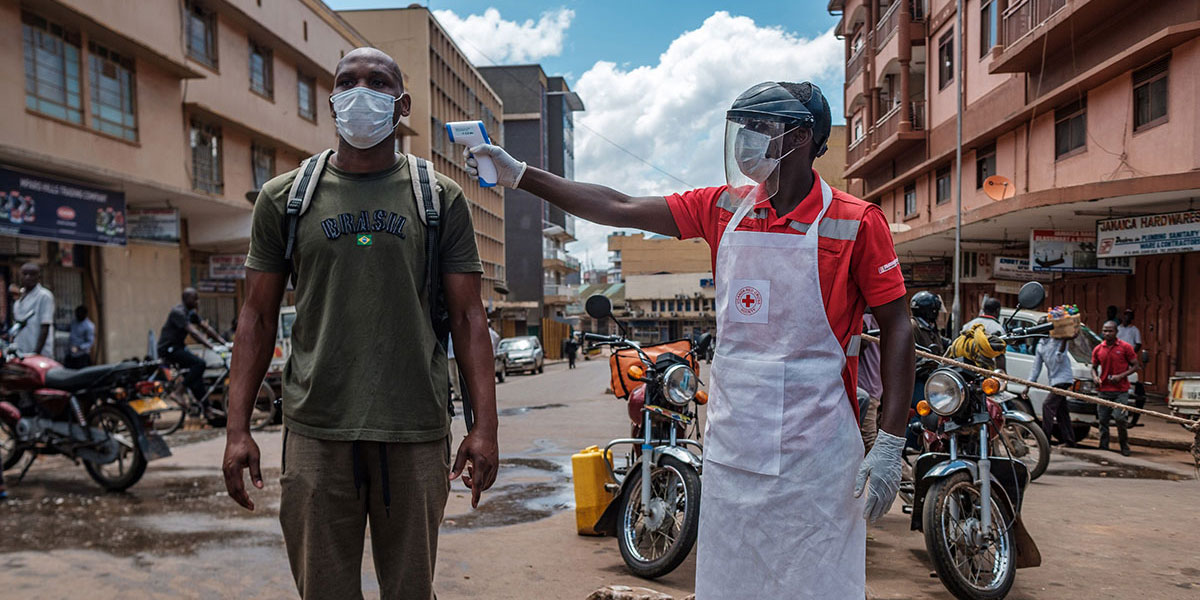COVID-19 responses across Africa are benefiting from lessons learned combatting infectious diseases such as cholera and tuberculosis, HIV/AIDS and Ebola, informed by World Health Organization (WHO) guidelines tailored to local demands.
A rapid and evidence-led response has managed the tensions between saving lives and preserving local culture – for instance between tradition and the need for rapid burials. The importance of the informal sector to national economies led some governments to allow levels of self-monitoring, while making sanitisers and other equipment available, and encouraging mutual responsibility on social distancing. The informal sector was initially seen by some as a possible ‘transmission belt’ for COVID-19, but has instead been recognised as a vital arena for containing the virus and also as a ‘starter motor’ for economic renewal.
The economic impact of COVID-19 may be longer lasting than the pandemic itself.
Tweet
Africa’s Centres for Disease Control and Prevention (CDC), supported frontline health professionals, who tracked COVID-19, helped provide objective data and advice, and be part of the global search for a cure.
However, African governments and partners must increase their commitment to science and public health in order to prepare for future shocks, attract investors, protect tourism, and stem the flow of young public health professionals and scientists to jobs overseas. These skills sets are key to Africa’s economic growth, stability and security.
COVID-19 has also highlighted the role of African security forces in supporting public health, sealing borders, enforcing quarantines, and maintaining public order. Despite tensions between the military and civilians, there has not been a general breakdown of law and order or widespread civil unrest.
Although fragile, the consensus between society, state and security sector has proved surprisingly resilient in Africa with Uganda, Senegal, Ghana and South Africa’s Medical Health Services Corps deploying military field hospitals and personnel to support national health institutions. Various militaries and police have transitioned from enforcement of ‘hard’ security to fulfilling their COVID-19 mandates through promotion of ‘soft’ human security. A few have exercised heavy-handedness, with violence and civilian deaths occurring in a number of countries. There is an urgent need to prioritize training in public order and crowd control, especially for police and in urban areas and informal settlements. A modern African peace and security architecture (APSA) needs to reflect the capability for security sectors to re-purpose themselves for a domestic policing role when needed.
Economically, COVID-19’s impact led the World Bank to project a 5.1% decline in sub-Saharan Africa’s 2020 economic growth, tipping the continent into recession. Fears of an economic shutdown in African economies already stung by falling oil and commodity revenues has prompted calls for debt repayment freeze for the next two years.
Sectors such as digital communications, mobile money and informal currency dealers, have found creative ways to survive or thrive during lockdown, while most African livelihoods have been severely impacted.
Africa’s diaspora has played a vital role in moderating these impacts, providing a social safety net, sourcing personal protective equipment (PPE), medicines, and food, as well as providing remittances and fundraising for Africa’s COVID-19 response. And, with diaspora business mogul Strive Masiyiwa co-ordinating the African Union (AU)’s continental PPE and equipment responses, the partnership between the diaspora and the continent has been immeasurably strengthened.
There are no simple solutions but reducing money transfer costs from the diaspora to Africa could make a difference. Sub-Saharan Africa continues to have the highest average remittance costs at about 9% – much higher than the 3% target of the Sustainable Development Goals (SDGs). Fair remittance transfers costs, including tax breaks, as well as diaspora remittances themselves need to be classed as ‘essential services’.
It is vital that research continues and that the lessons learned from Africa’s and the diaspora’s first exposure to the virus are shared and reflected in future policy. Resilience should not lead to complacency, which, in itself, would become a major risk.
Africa’s resilience to COVID-19 to date should not lead to complacency, which, in itself, would become a major risk.
Tweet
Dr Knox Chitiyo, Associate Fellow, Africa Programme.
Professor Martin Rupiya, Innovation and Training Manager, African Center for the Constructive Resolution of Disputes (ACCORD); Co-Editor, African Journal on Conflict Resolution.
Pamela Wadi, Managing Partner, Causeway Partners, UK.
First published on 3 June 2020 by Chatham House: https://www.chathamhouse.org/expert/comment/africa-s-covid-19-resilience-must-not-lead-complacency

